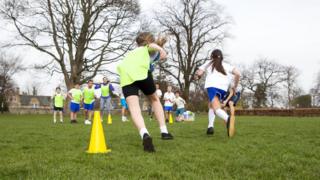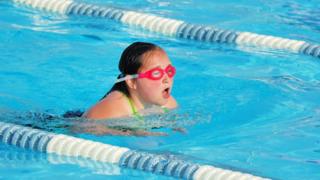- From the age of seven onwards, the quantity of workout done by boys and girls may be declining in the UK
- Sitting is changing physical pleasure from the time they start institution, study indicates
- This disappears against the recognised was of the opinion that exercise tails off in adolescence – and more quickly in girlfriends than sons
- Children aged five to 18 are recommended to do at the least one hour of employ every day
Adolescence is thought to be the time when children go off practice – but a study in The British Journal of Sports Medicine recommends it happens much more quickly, around the age of seven.
Researchers from Glasgow and Newcastle tracked the physical activity levels of 400 babes over eight years exploiting small-minded observes worn for a week at a time.
The amount of practice “their childrens” did was measured at age seven and then again at age nine, 12 and 15.
On average, boys spent 75 minutes per day activity once they are seven, falling to 51 hours when they were 15.
 Image copyright Getty Images
Image copyright Getty Images The average girl consume 63 minutes a day doing moderate to strenuous physical act when seven years old, which fell to 41 minutes age 15.
Most boys and girls in such studies did moderate levels of rehearsal at seven, which then gradually tailed off.
But one in five of the sons bucked current trends and managed to maintain their exercising ranks over the eight years.
They were the ones who started off with the highest levels of pleasure at the age of seven, health researchers said.
Sitting too much
Although the study cannot substantiate what causes the drop-off in physical act, Prof John Reilly, contemplate author from the University of Strathclyde, alleged “something is going wrong in British children” long before adolescence.
He said it coincided with the peak pace of obesity events in “childrens and” the greatest expanded in weight addition – which happen around the age of seven.
Different research on the same group of children found that the time lost to exercising was wasted sitting instead.
Children aged seven spent half the working day sitting, and by the age of 15 this had gone up to three-quarters of their day spent sitting.
“Activity posteriors off from around the time of attending school, when there’s a change in life, ” Prof Reilly said.
“Schools should be more active environs. There is even more pleasure cracks to break up long periods of sitting.”
 Image copyright Getty Images
Image copyright Getty Images But he emphasised that activities outside academy too had an important role to play because children only spent half of their time at academy in total.
The offsprings who took part in the study lives in Gateshead in north-east England and were tracked between 2006 and 2015.
Eustace de Sousa, national lead for children, young person and families at Public Health England, replied: “It’s a major concern that one in five children needles primary school obese.
“Most babes don’t do enough physical pleasure, which has consequences for their own health now and in the future, ” he said.
“It’s up to all of us to ensure brats get their recommended one hour of physical act a day.”
Mr De Sousa said this principle was at the core of the government’s childhood obesity contrive, which provided additional funding for academies to get offsprings moving and is supportive of families to keep offsprings active outside of school.
NHS Choices adds children and young people should cut back on the time they expend watching Tv, playing video game and passing by car.
How much exert should progenies be doing?
- at least 60 minutes of physical act every day – this should range from moderate pleasure, such as cycling and playground activities, to vigorous work, such as trot and tennis
- on three days a week, these activities should involve activities for strong muscles, such as gymnastics, and practises for strong bones, such as start and passing
Source: NHS Choices
Five gratuities for going your child to be more active
- march or hertz to academy as often as they are able to
- find epoch every weekend to do something active with your children
- take the dog for a go – if you haven’t got one, acquire one
- help young children in any sport, society or act that stakes them
- take part in a fun run or a kindnes challenge together

